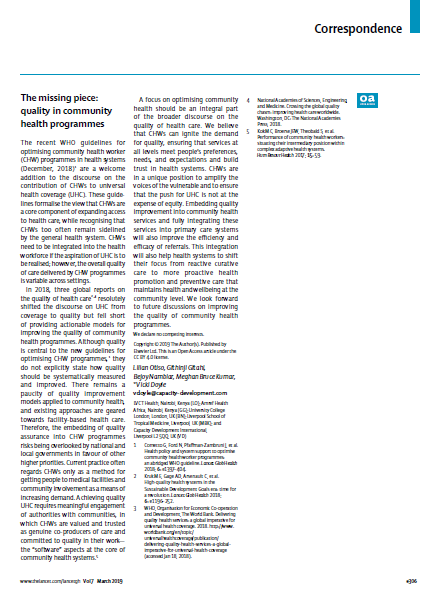The missing piece: quality in community health programmes

The recent WHO guidelines for optimising community health worker (CHW) programmes in health systems (December, 2018) are a welcome addition to the discourse on the contribution of CHWs to universal health coverage (UHC). These guidelines formalise the view that CHWs are a core component of expanding access to health care, while recognising that CHWs too often remain sidelined by the general health system. CHWs need to be integrated into the health workforce if the aspiration of UHC is to be realised; however, the overall quality of care delivered by CHW programmes is variable across settings.
In 2018, three global reports on the quality of health care resolutely shifted the discourse on UHC from coverage to quality but fell short of providing actionable models for improving the quality of community health programmes. Although quality is central to the new guidelines for optimising CHW programmes, they do not explicitly state how quality should be systematically measured and improved. There remains a paucity of quality improvement models applied to community health, and existing approaches are geared towards facility-based health care. Therefore, the embedding of quality assurance into CHW programmes risks being overlooked by national and local governments in favour of other higher priorities. Current practice often regards CHWs only as a method for getting people to medical facilities and community involvement as a means of increasing demand. Achieving quality UHC requires meaningful engagement of authorities with communities, in which CHWs are valued and trusted as genuine co-producers of care and committed to quality in their work—the “software” aspects at the core of community health systems.
A focus on optimising community health should be an integral part of the broader discourse on the quality of health care. We believe that CHWs can ignite the demand for quality, ensuring that services at all levels meet people's preferences, needs, and expectations and build trust in health systems. CHWs are in a unique position to amplify the voices of the vulnerable and to ensure that the push for UHC is not at the expense of equity. Embedding quality improvement into community health services and fully integrating these services into primary care systems will also improve the efficiency and efficacy of referrals. This integration will also help health systems to shift their focus from reactive curative care to more proactive health promotion and preventive care that maintains health and wellbeing at the community level. We look forward to future discussions on improving the quality of community health programmes.